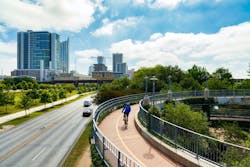ROADS/BRIDGES: Support for state-level gas tax increases in Southwest continue to lag
The New Mexico Senate, in an effort to improve the state’s roads and rebuild its cash reserves, approved a bill this week to increase the state gasoline tax for the first time in more than 20 years.
The measure, Senate Bill 95, would raise some $180 million annually through a range of taxes and fees. One part would raise the state gasoline tax to 27 cents per gallon from its present 17 cents and the tax on diesel fuel to 26 cents from 21 cents. A companion measure would boost the fee charged on the purchase of a new or used cars and trucks to 4% from 3%.
The effort, however, is apparently an empty one.
“If it reaches the governor’s desk, she will veto it,” said Chris Sanchez, a spokesman for Republican Gov. Susana Martinez. An override of Martinez’s veto is unlikely because the tax bill received support from only three of the Senate’s 16 Republicans.
Most of the new money derived from these increases would flow to the state general fund for three years until cash reserves reached 5%, or about $300 million, of the $6.1 billion operating budget. Only two years ago, state’s cash reserves exceeded $700 million, but are presently only $90 million.
“If we don’t fix this [roads] problem, our cost to finance loans and bonds will be nothing compared to this tax increase. And that’s not fiscally responsible,” said Sen. George Muñoz (D-Gallup).
Senators approved the tax bill 29-13. Sen. Clemente Sanchez, D-Grants, sponsored the measure, and all fellow Democrats voted for it. Only three Republicans voted to approve the measure.
A similar mindset also exists in Arizona, where Governor Doug Ducey, in conjunction with an infrastructure “wish list” sent to the Trump Administration, said flatly, “I’m opposed to raising taxes,” despite his willingness to concede that the state presently has pervasive unfunded transportation needs.
The governor’s wish list of more than $500 million worth of projects which was sent to the White House involve upgrades to existing roads, with improvements on I-10, largely in the Phoenix area, sitting at the top of the list. There also is a request for $135 million to improve Arizona 189, the three-mile stretch of road that connects I-19 with the international border.
Somewhat contradictorily, Ducey also stated, “I’m not opposed to investing in roads and bridges,” citing the $86 million that was added in the current fiscal year’s budget to the Highway User Revenue Fund, the account that finances such improvements. This was, however, only a one-time cash infusion. The governor’s budget for the coming fiscal year takes back those dollars.
